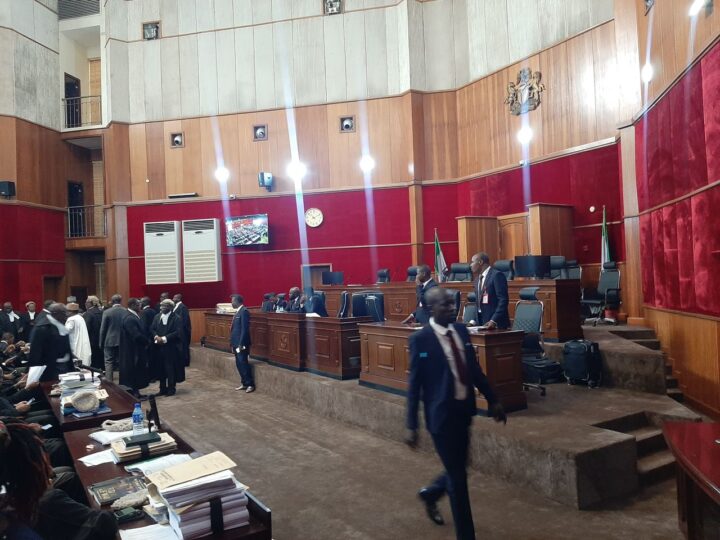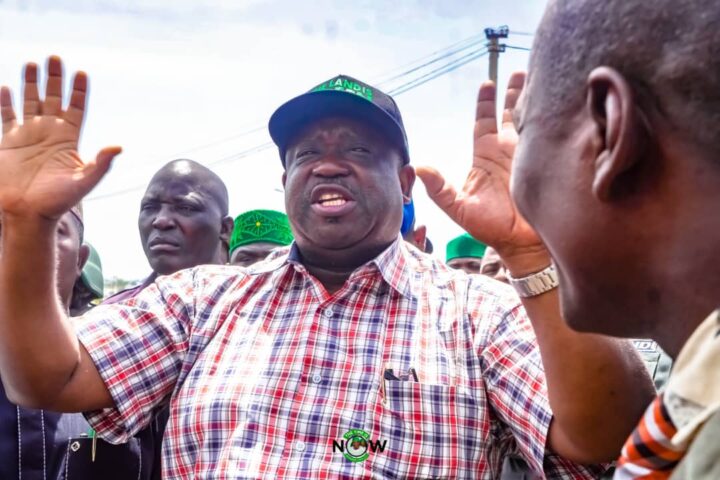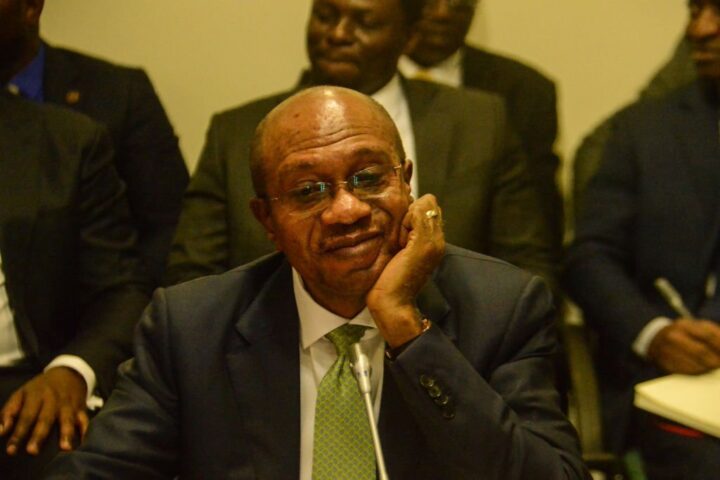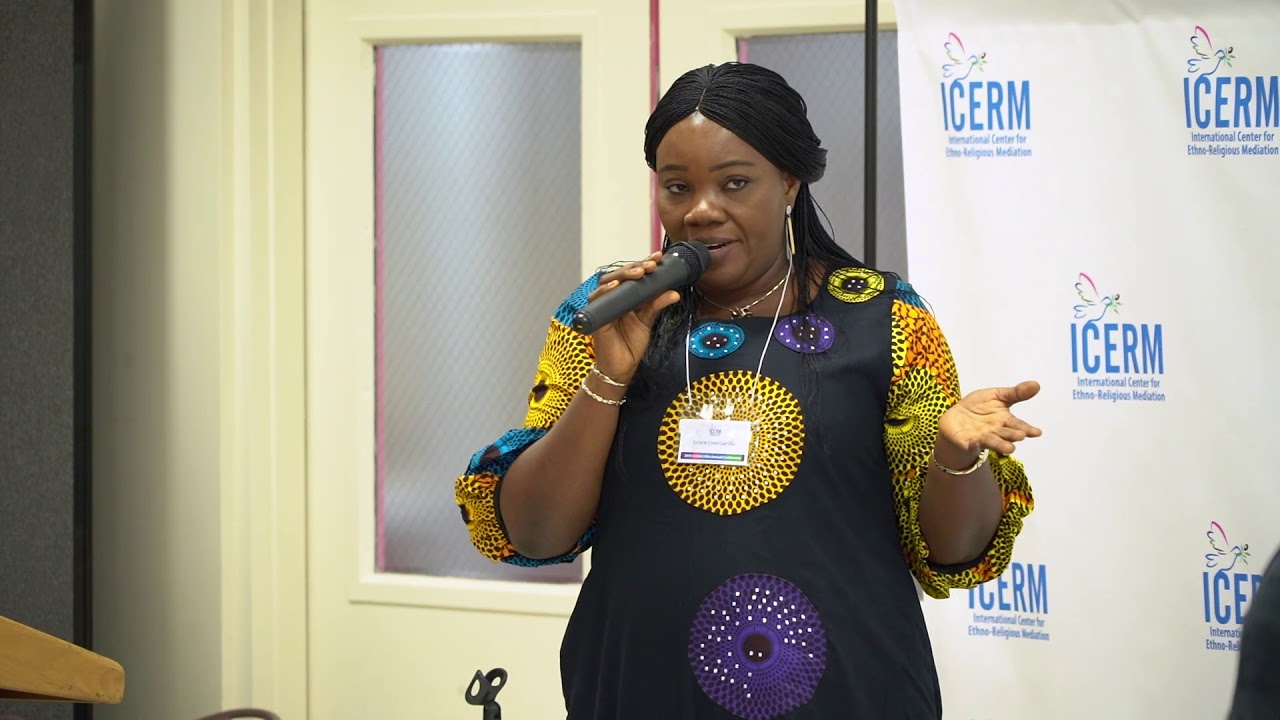The presidential election petition tribunal session on Friday was eventful as always with lawyers debating the appropriateness of playing a video evidence tendered by the Labour Party (LP), among other issues.
Here are five takeaways.
LP PRESENTS REPORTER AS WITNESS
At the resumption of proceedings, the LP presented a journalist from Channels Television, identified as Lucky Ukpewo, as a subpoenaed witness.
Advertisement
Ukpewo, an editor with the TV station, was asked to play interviews with Mahmood Yakubu, chairman of the Independent National Electoral Commission (INEC), and Festus Okoye, a national commissioner.
The LP said the video clips were stored in flash drives.
The video was said to contain interviews wherein Okoye and Yakubu gave assurances on the functionality of the bimodal voter accreditation system (BVAS) in the presidential election.
Advertisement
CONTROVERSY OVER VIDEO CLIPS
The attempt by Jibrin Okutepa, counsel to LP, to introduce the flash drives as evidence was met with stiff resistance.
While Kemi Pinheiro, counsel to INEC, did not object to the admissibility of the evidence, Akin Olujimi, counsel to President Bola Tinubu and Vice-President Kashim Shettima, raised an objection.
Olujimi objected on the ground that the flash drives were not served on him until during proceedings, adding that he will need time to view the content.
Advertisement
He said the content is unknown, noting that it would deprive the second and third respondents of their right to a fair hearing.
The counsel also said the witness presented by the LP was not competent to testify and asked the court to dismiss him.
In reaction, Okutepa told the court to dismiss the argument, maintaining that the witness was competent to testify.
RESOLVING THE ROW
Advertisement
Following arguments between the lawyers of the petitioners and the respondents, the five-member panel led by Haruna Tsammani admitted the flash drives as exhibits.
Subsequently, Afolabi Fashonu, counsel to the All Progressives Congress (APC), and Olujimi asked the court for time to review the contents of the flash drives and prepare for cross-examination before they are played before the court.
Advertisement
The court granted their request and ruled that the contents of the flash drives would be played during the next sitting on June 10.
ATIKU PRESENTS EX-CORPS MEMBERS AS WITNESSES
Advertisement
Atiku Abubakar, presidential candidate of the Peoples Democratic Party (PDP), presented three witnesses to testify before the tribunal.
The witnesses — identified as Grace Ajagbonna, Abidemi Joseph and Obasa Edosa — told the court they were employed by INEC as ad-hoc staff and served as presiding officers during the February 25 presidential election in Kogi, Niger and Edo states respectively.
Advertisement
The witnesses were led in evidence by Chris Uche who sought to adopt their written statements.
Lawyers of the respondents — INEC, President Bola Tinubu and the All Progressives Congress (APC) — objected to the admissibility of the documents and said they would reserve their objections until the final address.
The statements of the witnesses were however admitted as evidence by the court.
‘ELECTION WENT WELL’
The witnesses told the court that the presidential election was conducted smoothly in their respective polling units.
The former corps members said they were trained by INEC, adding that they complied with all the rules and regulations regarding the conduct of the election.
However, the witnesses said they faced difficulty in uploading the results from their polling units.
During cross-examination, Abubakar Mahmoud, counsel to INEC, asked Ajagbonna, the first witness, if she complied with the instructions on the use of the bimodal voter accreditation system (BVAS).
Responding, the witness answered in the affirmative.
“The accreditation process went well. The voting process also went well. I collated the results and recorded them in Form EC8A by myself. I signed and the party agents also signed,” Ajagbonna said.
“My Lord, to be sincere, I was not happy. I was not happy that I was not able to transmit the result of the presidential election.
“Everything else went peacefully. The election went well.”
Joseph and Edosa gave similar testimonies to the court.
Add a comment






